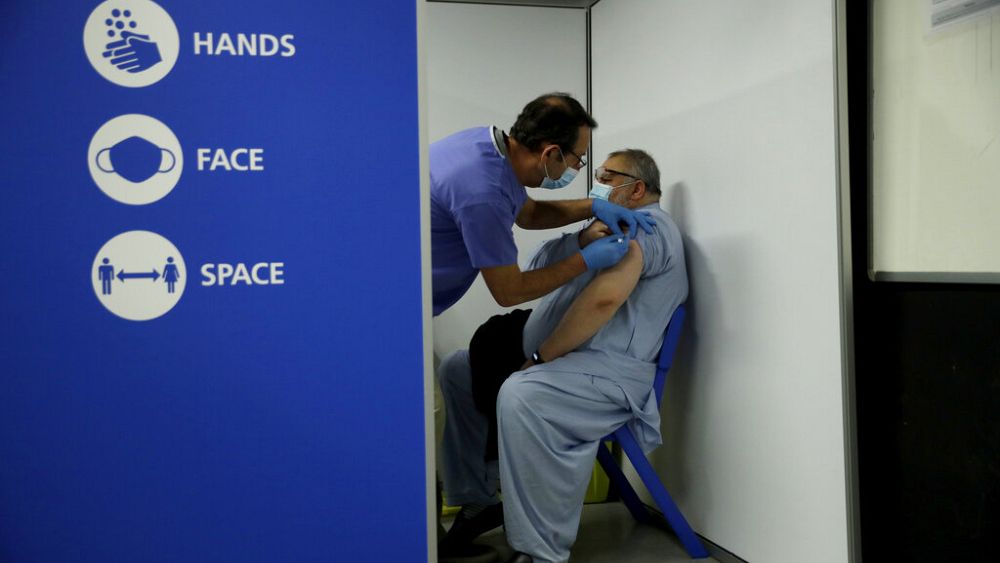
The UK said on Tuesday that it will offer a third dose of coronavirus vaccine to everyone over 50 and other vulnerable people to help the country ride out the pandemic through the winter months.
The booster shots, which will be rolled out beginning next week, were approved a day after the Conservative government also backed plans to offer one vaccine dose to children 12 to 15 years old.
The announcement came on the day Boris Johnson set out the government’s plan for tackling COVID-19 over the autumn and winter months in England. Scotland, Wales and Northern Ireland confirmed they are to make similar moves.
Speaking from a news conference in Downing Street, the prime minister called the UK’s COVID-19 situation “actually more challenging” than it had been a year ago.
The government advisory body, the Joint Committee on Vaccination and Immunisation (JCVI), recommended that booster shots be offered to everyone over 50, health care workers, people with underlying health conditions and those who live with people whose immune systems are compromised. They will be given no earlier than six months after a person received their second dose of vaccine.
Around 30 million people will be eligible for the booster shots, which aim to protect against a modest waning in immunity among those who have received two jabs.
The JCVI said the Pfizer vaccine should be the primary choice for booster shots, with a half-dose of Moderna as an alternative.
The decision to offer booster shots is not one that’s being recommended by the World Health Organization, which has asked wealthy nations to delay giving them out until every country has vaccinated at least 40% of their people. Only a few other wealthy countries have recommended their use.
England’s chief medical officer, Chris Whitty, said it’s hugely important that developing countries get the jabs they need, saying the UK had an “absolute moral imperative” to make sure vaccines were donated. But he pointed to the difficulties in transporting the Pfizer vaccine, which has a relatively short shelf-life and needs to be kept at super-chilled temperatures.
Child vaccinations ‘not handled well’
Commenting on the state of the pandemic in the UK, Boris Johnson said there were “higher levels of daily cases, thousands more” than a year ago. But he claimed that the British people were “incomparably better placed to fight the disease” due to high levels of vaccination and antibodies against COVID among the population.
However while the prime minister did not say that measures like mask mandates and so-called “vaccine passports” would be brought in over winter, he did not rule out such measures.
The UK decided on Monday to offer COVID-19 vaccines to children 12 and up, as the government gambled that expanded vaccination and mild tweaks to social behaviour can avert the need for lockdowns in the winter.
The chief medical officers of England, Scotland, Wales and Northern Ireland recommended that children aged 12 to 15 be given a single dose of the Pfizer/BioNTech vaccine, despite the government’s vaccine advisors saying this month that the step would have only marginal health benefits.
“It will reduce transmission but it will also reduce the rate of infection in young people, and critically will prevent them from getting Long Covid, which we know is a problem,” said Martin McKee, Professor of European Public Health at the London School of Hygiene and Tropical Medicine, welcoming the move.
“This has not been handled well,” he told Euronews Tonight. “Other countries have looked at the evidence and decided the benefits outweigh any risks in this age group — the United States, France, many European countries, and have already started vaccinating people, in fact many millions of children have now been vaccinated.”
Attack on vaccine ‘myths’
Appealing to everyone eligible for a vaccine to get one as soon as possible, Chief Medical Officer Chris Whitty said there is a “very substantially smaller” risk of being admitted to a hospital with COVID-19 if someone is vaccinated compared to those who are not. He said someone in their 30s who is unvaccinated is running the same level of risk as someone in their 70s who is vaccinated.
“One of the most depressing things for doctors, including myself, is talking to people who have just chosen not to get vaccinated because it wasn’t convenient at that particular moment. And you see them being wheeled down to intensive care, and you know this was a very serious problem as a result of them not being vaccinated,” he said.
Whitty also took aim at those who spread misinformation about the vaccines after being asked about comments from rapper Nicki Minaj. The singer indicated in a series of tweets that she may have contracted COVID-19 but said she would not be pressured into getting a vaccine shot for the Met Gala, which she did not attend. She tweeted Monday that the New York event required guests to be jabbed and also shared an unsubstantiated story about vaccine risks and impotency.
“There are a number of myths that fly around, some of which are just clearly ridiculous and some of which are clearly designed just to scare,” Whitty said. “That happens to be one of them. That is untrue.”
Whitty said people “peddling untruths” to discourage others from getting the vaccine should be “ashamed” of themselves.

mynet sunar